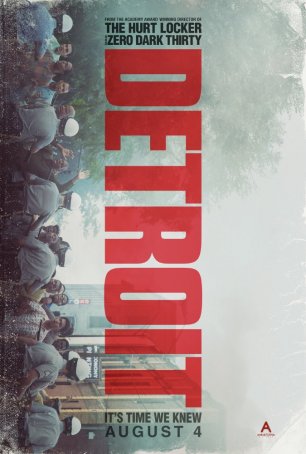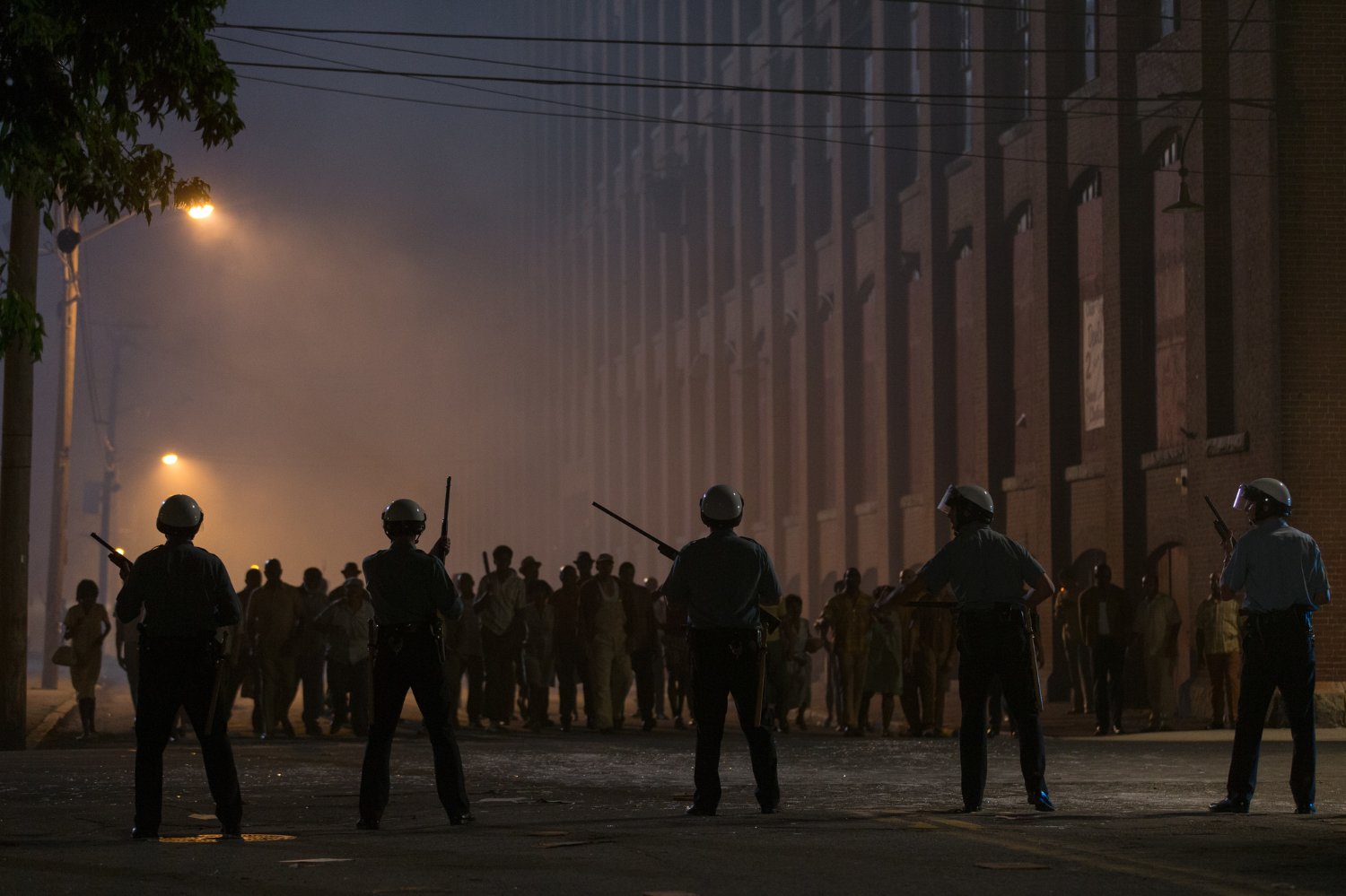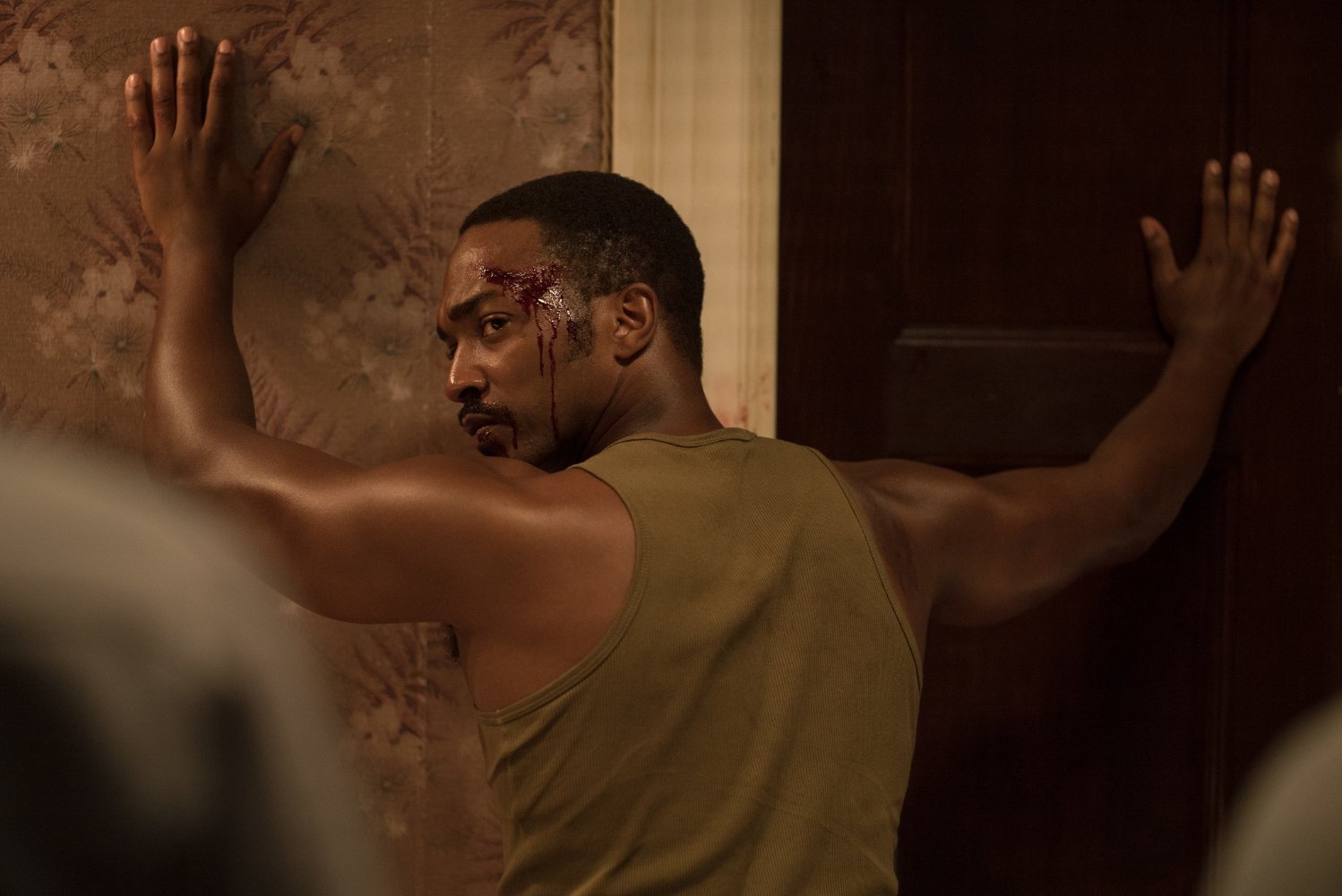Detroit (United States, 2017)
August 01, 2017
In July 1967, civil unrest resulting from the brutality of the predominantly white Detroit police department reached a boiling point. The result, which history has named the “12th Street Riot”, was one of the deadliest and destructive riots in American history. It lasted five days and, when it was over, 43 people had died and hundreds of millions of dollars in property damage had been recorded. As a follow-up to her controversial Zero Dark Thirty, director Kathryn Bigelow, again working from a script by Mark Boal, has turned her lens toward this period in history, focusing particular attention on one of the most tragic events of the riots – the so-called Algiers Motel Incident.
Detroit has a clear three-act structure. The first segment, which runs for about 30 minutes, sets up the situation, introducing the characters and showing how the riots began. The middle, which is the longest, presents a speculative chronology of what happened in the Algiers Motel during the night of July 25-26. Since there is no definitive account and court transcripts are vague about some of what happened, Bigelow and Boal relied on eyewitness reports and fictionalized certain aspects. They were not allowed to use John Hersey’s detailed book about the incident because the rights were not available. The film’s closing act recounts the legal proceedings that resulted from the night’s events.
 The movie’s centerpiece is the hour spent in and around The
Algiers – a cheap motel known for prostitution and drugs. When combined law
enforcement groups (local cops, state police, and national guard) believe they
are being fired upon from the motel’s vicinity, they raid the place. Soon, one
person is dead and nine others – seven black men and two white women – are
being terrorized by three racist cops. Others on the law enforcement side,
recognizing that the Detroit P.D. officers have crossed more than one line,
back off, not wanting to be involved. When physical intimidation fails to get
the cops what they want (the name of the supposed “sniper”), they begin a
scheme of psychological torture that goes horribly wrong when one officer
misunderstands what’s going on and kills one of the suspects.
The movie’s centerpiece is the hour spent in and around The
Algiers – a cheap motel known for prostitution and drugs. When combined law
enforcement groups (local cops, state police, and national guard) believe they
are being fired upon from the motel’s vicinity, they raid the place. Soon, one
person is dead and nine others – seven black men and two white women – are
being terrorized by three racist cops. Others on the law enforcement side,
recognizing that the Detroit P.D. officers have crossed more than one line,
back off, not wanting to be involved. When physical intimidation fails to get
the cops what they want (the name of the supposed “sniper”), they begin a
scheme of psychological torture that goes horribly wrong when one officer
misunderstands what’s going on and kills one of the suspects.
The sequences inside the Algiers are as uncomfortable and harrowing as anything Bigelow has done before, whether in The Hurt Locker or the torture scene in Zero Dark Thirty. The segment’s relentless nihilism calls to mind Michael Haneke’s Funny Games. Detroit is so effective at what it does and how it accomplishes its aims that it becomes almost unwatchable. We are privy to the ugliest of human impulses laid bare as unprincipled men with power use that power to terrorize innocent people whose only crime is to be in the wrong place at the wrong time.
One unfortunate side-effect of having such an intense middle act is that everything that follows seems anticlimactic. Detroit’s final 45 minutes, which chronicle the aftermath, are disjointed and only mildly compelling. By the time the scenes in the Algiers end, we are drained. From an emotional standpoint, that’s the denouement but Bigelow and Boal, wanting to put things in a wider context and show how the courts were complicit in protecting racist attitudes, continue the proceedings.
 The ensemble cast is devoid of big names. The closest Detroit has to a main character is
would-be Motown singer Cleveland Larry Reed, played by Algee Smith. He and his
friend, Fred Temple (Jacob Latimore), are on their way home from a canceled gig
when they take refuge at The Algiers. There they meet Juli Hysell (Game of Thrones’ Gilly, Hannah Murray)
and Karen Malloy (Kaitlyn Dever). Another man staying in the motel is Vietnam
Vet Robert Green, played by Anthony Mackie. The three racist cops (whose names
were changed from those of their real-life counterparts) are portrayed by Will
Poulter, Jack Reynor, and Ben O’Toole. John Boyega is Melvin Dismukes, a
security guard who leaves his nearby post to help out the law enforcement
effort at the Algiers and does what he can to curb the policemen’s excesses.
The ensemble cast is devoid of big names. The closest Detroit has to a main character is
would-be Motown singer Cleveland Larry Reed, played by Algee Smith. He and his
friend, Fred Temple (Jacob Latimore), are on their way home from a canceled gig
when they take refuge at The Algiers. There they meet Juli Hysell (Game of Thrones’ Gilly, Hannah Murray)
and Karen Malloy (Kaitlyn Dever). Another man staying in the motel is Vietnam
Vet Robert Green, played by Anthony Mackie. The three racist cops (whose names
were changed from those of their real-life counterparts) are portrayed by Will
Poulter, Jack Reynor, and Ben O’Toole. John Boyega is Melvin Dismukes, a
security guard who leaves his nearby post to help out the law enforcement
effort at the Algiers and does what he can to curb the policemen’s excesses.
It’s possible to nitpick the historical accuracy of the film. Perhaps remembering the backlash associated with Zero Dark Thirty, Bigelow adds a disclaimer. She takes license with some of what happens but, at least based on the extensive research done by Hersey and others, she’s not far from the truth. The facts argue that a gross miscarriage of justice occurred; Detroit’s script presents a plausible scenario of how things might have transpired, bolstered by eyewitness accounts and the court record.
Considering the current state of relations between police and citizens in highly populated urban areas, Detroit functions as much as a dramatization of things that happened as a cautionary tale of where we could be headed: Those who don’t learn from history are doomed to repeat it. Bigelow’s point is that racial animus has no part in police work and, when it occurs and is condoned and excused, it can turn human beings into monsters. Detroit, despite its flaws, is compelling and deeply unsettling. Its thriller and horror elements gain resonance because, at least to some degree, they’re based on real events. Detroit captures attitudes and actions that can never be forgotten. By remembering them, hopefully we can ensure that they don’t recur… although that prospect grows fainter with seemingly every news story.
Detroit (United States, 2017)
Cast: Algee Smith, Anthony Mackie, Ben O’Toole, Kaitlyn Dever, Jack Reynor, Jason Mitchell, Hannah Murray, Will Poulter, John Boyega, Jacob Latimore, Nathan Davis Jr.
Home Release Date: 2017-12-12
Screenplay: Mark Boal
Cinematography: Barry Ackroyd
Music: James Newton Howard
U.S. Distributor: Annapurna Pictures
U.S. Release Date: 2017-08-04
MPAA Rating: "R" (Violence, Gore, Profanity, Sexual Content, Brief Nudity)
Genre: Drama/Thriller
Subtitles: none
Theatrical Aspect Ratio: 1.85:1
- Hate U Give, The (2018)
- Judas and the Black Messiah (2021)
- (There are no more better movies of Algee Smith)
- (There are no more worst movies of Algee Smith)
- (There are no more better movies of Ben O’Toole)
- (There are no more worst movies of Ben O’Toole)

Comments